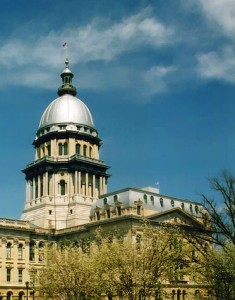December 22, 2012
By Chris Cox
 On Dec. 11, 2012, the United States Court of Appeals for the Seventh Circuit handed gun owners — and all freedom-loving Americans — a major victory, striking down the State of Illinois' total ban on carrying firearms outside the home or workplace for protection.
On Dec. 11, 2012, the United States Court of Appeals for the Seventh Circuit handed gun owners — and all freedom-loving Americans — a major victory, striking down the State of Illinois' total ban on carrying firearms outside the home or workplace for protection.
That ruling is a major step forward in the NRA's long-term battle to strengthen constitutional guarantees of the right to self-defense.
The case, Shepard v. Madigan, was brought by Mary E. Shepard, who was seeking to exercise her right to self-defense after suffering a brutal beating — at her church, shockingly — by a violent criminal. The NRA's state affiliate, the Illinois State Rifle Association, was also a plaintiff in the case, which was fully funded by the NRA.
The court's opinion, written by noted jurist Judge Richard Posner, held that the complete ban on right-to-carry in the state of Illinois is inconsistent with the U.S. Supreme Court's interpretation of the Second Amendment in District of Columbia v. Heller and McDonald v. City of Chicago, and therefore unconstitutional.
Advertisement
Ever since those two decisions were handed down, anti-gun activists and governments have argued that because the Supreme Court only struck down bans on handgun possession in the home, the Second Amendment provides no protection anywhere else. Judge Posner rejected that distinction as "irrational," pointing out that "a Chicagoan is a good deal more likely to be attacked on a sidewalk in a rough neighborhood than in his apartment on the 35th floor of the Park Tower."
While the appeals court invalidated the Illinois carry ban, it gave the Illinois legislature 180 days to craft a new law that complies with the Second Amendment. While that may still be delayed due to appeals, it means that at least in the short term, the Illinois legislature will have to tackle the Right-to-Carry issue. Of course, anti-gun politicians have already attacked the ruling. Chicago's anti-gun mayor, Rahm Emanuel, called the decision "wrongheaded" and other anti-gun legislators are urging the state to appeal the decision.
It's a fair bet that those anti-gun legislators and anti-gun Gov. Pat Quinn, who recently proposed an "assault weapons" law that would have banned common semi-automatic rifles like the Ruger 10/22, will try to pass the most restrictive carry law possible. That's the same kind of massive legislative resistance that we saw in Washington, D.C., and Chicago when the Supreme Court struck down those cities' laws.
Advertisement
But it's also important to note that in 2011, a majority of the Illinois House voted for a very mainstream Right-to-Carry bill. That bill only failed due to a parliamentary maneuver by opponents that required the bill to win a super-majority. Needless to say, this year the NRA will strongly support passage of a carry law that fully respects Illinoisans' Second Amendment rights.
Needless to say, the Shepard case isn't the only Right-to-Carry case working its way through the courts. The week before the Seventh Circuit's decision, the Ninth Circuit U.S. Court of Appeals heard arguments in the NRA-supported case of Peruta v. County of San Diego and three other cases challenging carry permit laws and policies in California and Hawaii. Unlike Illinois, those states don't completely ban carry, but give local officials arbitrary power to decide whether a permit applicant has a "need" to carry a firearm for self-defense.
Days before those arguments, the Second Circuit federal appeals court upheld New York's similar law, wrongly concluding that the right to bear arms is more limited outside the home and that the state's "proper cause" requirement is "substantially related to New York's interests in public safety and crime prevention." And a month before that, the Fourth Circuit heard arguments in a case testing a similar Maryland law, which had earlier been struck down by a lower federal court.
We don't know yet whether one of these cases might lead the Supreme Court to firmly speak out on the Right-to-Carry issue. For now, though, the Shepard decision makes clear that we're making important steps in the fight to have Second Amendment rights honored as fully as they deserve.
Chris W. Cox is the Executive Director of the National Rifle Association Institute for Legislative Action and serves as the organization's chief lobbyist. Please give your support to NRA-ILA today.
Enjoy articles like this?
Subscribe to the magazine.
Get access to everything Guns & Ammo has to offer.
Subscribe to the Magazine
